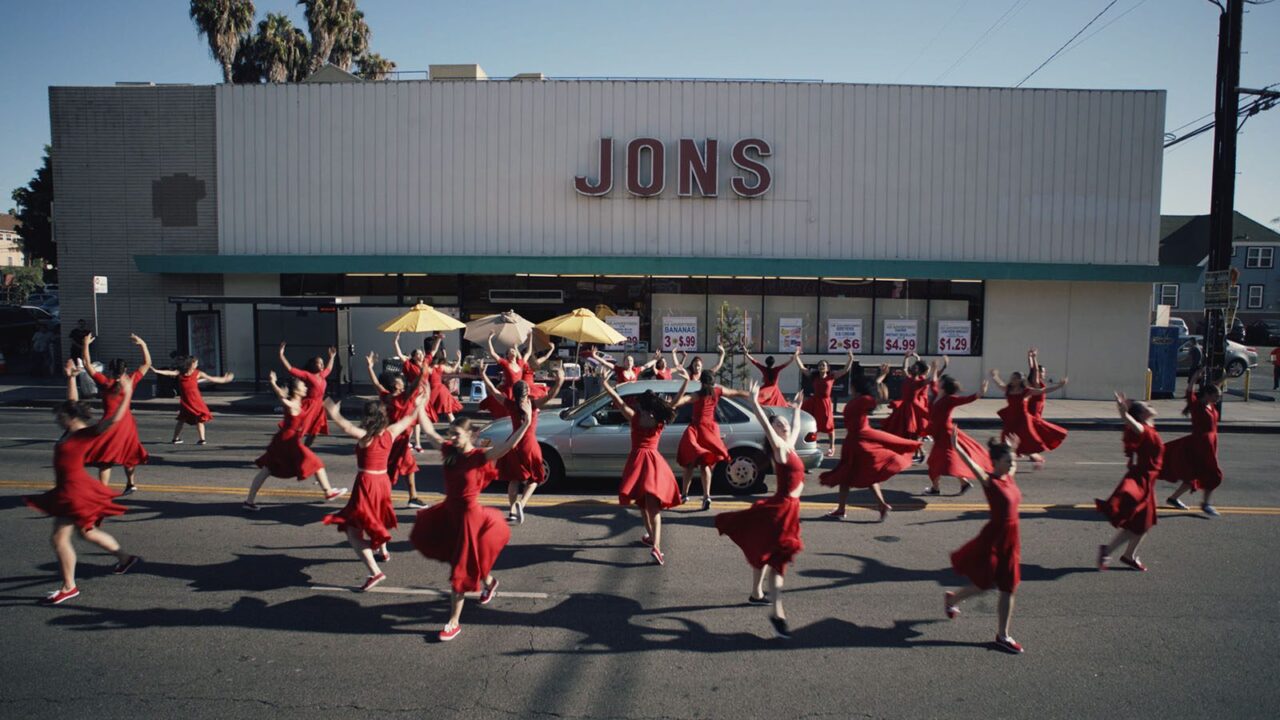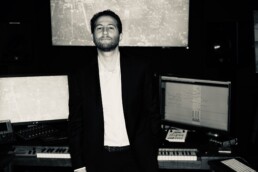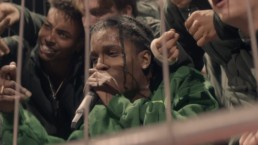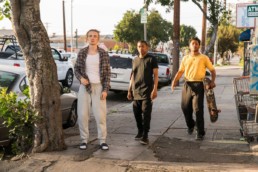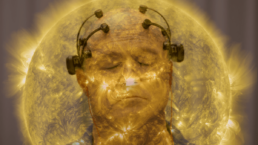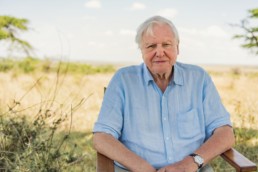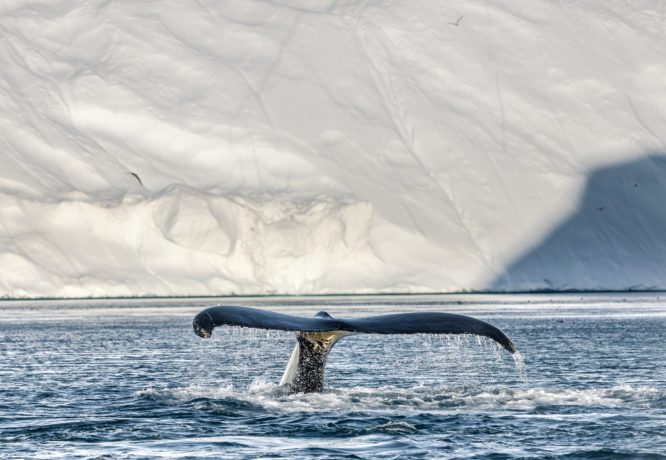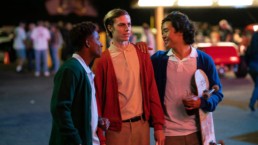'Summertime' Review: Visual Poetry Lights up Los Angeles
When Amanda Gorman took the stage in January at the 2021 Presidential Inauguration, two things happened. One, she sparked a meteoric rise of her own accord, landing nationwide notoriety, book deals, and an IMG modeling contract. She also–maybe more importantly–normalized and encouraged younger generations to explore spoken word poetry for themselves, proving that age is not a factor when it comes to self-expression.
In his latest film, director Carlos López Estrada (Blindspotting, Raya and the Last Dragon) shows how the streets of Los Angeles are filled with inspirational youth who are ready to speak their truth in the spoken-word musical, Summertime. Like an indie version of In the Heights for millennials (complete with mixed races and various skin tones!), Summertime is a feel-good film full of literal visual poetry and promising artists of tomorrow.
The story of how Summertime came to be is just as impressive as the film itself. Together with López Estrada and Executive Producer Kelly Marie Tran, twenty seven youth poets workshopped their material over the course of one Summer in Los Angeles. The result is this feature film, a loose narrative structure comprised of intersecting stories from the poets themselves, all of whom make their feature film debut as co-writers and stars.
Depending on the scene (and therefore the dialogue), Summertime is a mix of emotional, comedic, and nostalgic instances that reflect the authenticity of the poets. One scene humorously calls out the prices at trendy Los Angeles eateries, and how a piece of avocado toast costs the same as basic livelihood necessities for lower income communities. Another scene shows an empowered queer woman giving a fierce monologue as she stands up for another same sex couple on a metro bus. Perhaps the most heart-wrenching scene comes in the form of a formally insecure woman finally standing up for herself to a manipulative ex-boyfriend.
I believe the success of Summertime comes from untraditional factors. The overall narrative and acting is fairly good, not outstanding, but what makes this film unforgettable is the outpouring of pure visual poetry (which outweighs any nitpicky criticism). Dave Harris, Mila Cuda, Olympia Miccio, Tyris Winter, Amaya Blankenship, Bene't Benton, Hanna Harris, Marco Bizio, Raul Herrera, Bryce Banks, Marquesha Babers, Walter Finnie Jr., Anna Osuna, Zach Perlmutter, Jason Alvarez, Austin Antoine, Maia Mayor, Madyson Park, Xochitl Morales, Paolina Acuña-González, Marcus James, Gordon IP, Cyrus Roberts, Pathum Madigapola, Nia Lewis, Daniel McKinley, Khamal Iwuanyanwu, and Lukas Lane: job well done. Thank you for sharing your stories with us.
Distributed by Good Deed Entertainment. Now playing in select theaters in Los Angeles and New York. Expanding nationwide Friday, July 16.
Max Aruj Shares His New Track From Gangster Film ‘Lansky’
Max Aruj reunites with writer-director Eytan Rockaway in Lansky, a crime drama starring Sam Worthington and Harvey Keitel as the legendary gangster Meyer Lansky.
After collaborating with Rockaway on the psychological thriller The Abandoned (2015), Aruj felt comfortable delving even deeper creatively with Lansky's score. The result is a beautifully intertwined sonic reflection of both the darkness and sentimentality of the complicated Meyer Lansky. But before we listen to the exclusive track, continue reading to learn more about the man behind the music.
Max Aruj was born to score. After taking to classical music at 6 years old, he went on to receive a Bachelor's in Music Composition at the USC Thornton School of Music. Since then, his contribution to the world of composition with a classical flare has brought him to both the indie music stage and the Hollywood silver screen. Aruj composed and conducted arrangements for DJ and producer Gryffin at Coachella 2019 (and co-produced his orchestral album 'Gravity (Deluxe)' in 2020), as well as composing additional music on Mission: Impossible - Fallout for Lorne Balfe and The Crown for Hans Zimmer and Rupert Gregson-Williams.
Cinemacy is thrilled to premiere the opening title track from Aruj's latest film, Lansky. Listen below.
"Working on Lansky really pushed me to dig deep to come up with a melody that encapsulates his whole life. He experienced both great triumph, and great sadness. He stopped at nothing to achieve his goals, but at great costs,” says Max Aruj.
The title track, which runs about five minutes long, starts slow with a quietly beautiful blend of strings and builds to an all-encompassing anthem that is both full and bold.
The soundtrack will be released on June 25 on Lakeshore Records — the same day of the U.S. theatrical release. You can now pre-save the album here.
'Rise Again: Tulsa and the Red Summer' Review: Bodies And Stories Were Buried–Until Now
Throughout history, the United States has been the home of dozens of racially-fueled massacres that were never brought to light. One of the most egregious atrocities is the 1921 Tulsa, Oklahoma race massacre which saw an entire community burned down by white mobs. Over 300 black men, women, and children were killed and dumped in unmarked mass graves, their possessions stolen, and dignity affected for generations. In the documentary Rise Again: Tulsa and the Red Summer, documentarian Dawn Porter sheds light on this horrific tragedy and challenges our idea of what justice looks like today. Make America great again? For a large majority of minorities, America was never great to them before.
Expression
Dawn Porter is one of the most important working filmmakers today. She has her finger on the pulse of culturally significant stories about strong figures who stand up for what they believe in, even if it's against the status quo. Rise Again's message compliments Porter's previous work, including The Way I See It and John Lewis: Good Trouble. She is a natural storyteller who elicits empathy but never weakness from her subjects. Her delicate approach to such a heavy topic is a natural skill. Despite the death and destruction that permeates the narrative, Rise Again leaves us with an activated sense of introspection about how we can create a more just tomorrow.
Expression: 4 out of 5 stars
Daring
For many people who lived through the 90s, the term "race riot" might bring to mind the horrific images of the Rodney King riots in Los Angeles. However, race riots have been around for decades, as documented in Rise Again's stark black and white photographs. The film centers around award-winning Washington Post journalist and Oklahoma native DeNeen Brown who, along with descendants of the Tulsa Massacre victims and current Tulsa state officials, speak to the reality of what happened 100 years ago and how it is still affecting the black population today. It's uncomfortable to see just how dehumanizing the black community was made to feel at the hands of white people, but Dawn Porter educates viewers in a way that doesn't feel shameful or spiteful, just hopeful for a better future for all.
Daring: 4 out of 5 stars

Craft
Like all of Porter's film, Rise Again is a finely-tuned cinematic achievement. The combination of compelling sit-down interviews interspersed with archival footage and photographs from 100 years ago humanizes the victims in a way that will leave anyone breathless. Every interviewee is given ample time to make sure their personal stories are heard and the result is a deeply felt tapestry of resilience and strength. Dawn Porter and crew really nailed this one.
Craft: 4 out of 5 stars
Impact
The term "Red Summer" was coined because the blood from black bodies flowed through the streets nonstop. Innocent black communities and individuals were targeted by white men who unjustly feared their jobs or lives were in danger, and were killed by the hundreds. Yet, these events have been historically left out of American history books because of shame and guilt. Pretending that these massacres never happened is equally offensive as the acts themselves, and that is why Rise Again: Tulsa and the Red Summer is so important to American cultural awareness. This film is an important piece of history.
Impact: 5 out of 5 stars
Conclusion
The ghosts of racial tension that were present in 1921 still haunt us today, 100 years later. Educating people about the truth of these events – however horrific and upsetting – will hopefully lead our nation towards collective healing and conscious change. Ignoring the stains on our past is not progress, we must acknowledging our wrongdoings to make sure history doesn't repeat itself.
Conclusion: 4 out of 5 stars
'Rise Again: Tulsa and the Red Summer' will premiere on National Geographic on Friday, June 18, and will air globally in 172 countries and 43 languages. It will also be available to stream on Hulu the same day, commemorating Juneteenth – a day that celebrates when the last enslaved Black people in Texas received news of their emancipation, marking the official end to slavery in the United States.
'Stockholm Syndrome' Tribeca Review: A$AP Rocky Recounts His (Unfair) Arrest
In July of 2019, A$AP Rocky was arrested in Sweden and charged on suspicion of assault after a violent incident that was provoked by two young men went public. A video shared by TMZ went viral, and it didn't help that their clickbait headline wasn't an accurate depiction of what actually happened. In the new documentary Stockholm Syndrome, the Swedish authorities were going to make an example out of A$AP Rocky, and it didn't matter whether the punishment fit the "crime."
Directed by The Architects, Stockholm Syndrome shows how A$AP Rocky addresses that time in his life when money or fame couldn't get him out of legal problems, no matter how unfair and racially motivated they seemed to be.
The documentary goes in-depth into the early life of A$AP Rocky, born Rakim Mayers. Even as a child, his mother and his friends all considered him to be a pioneer and trendsetter whose natural born talent never went unnoticed.
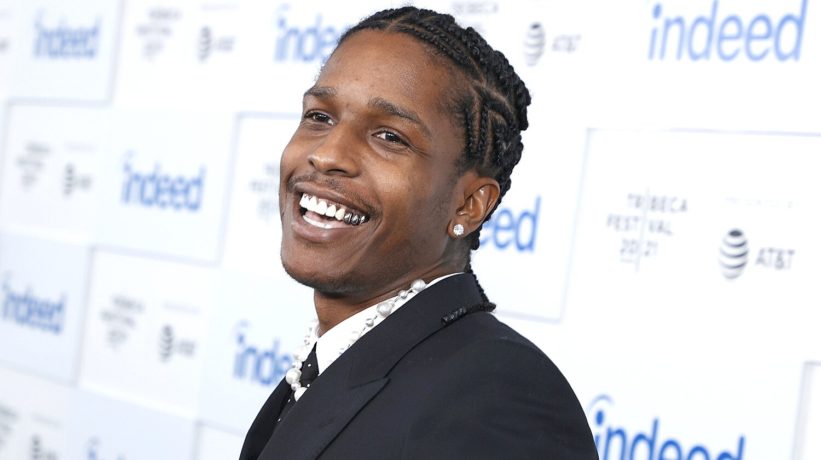
Speaking directly to the camera, A$AP Rocky reflects back on his upbringing, growing up with a father in prison and without black peers in school. He found refuge in music and the authenticity in his words connected with so many, catapulting him into superstardom.
About half of Stockholm Syndrome covers the arrest and trial of A$AP Rocky, in real time. Playing out like a courtroom drama with the engaging Slobodan Jovicic as A$AP Rocky's defense attorney and former President Donald Trump's unrequested involvement, the energy and anticipation is thrilling to watch, even if we already know what happens. The film also gathers interviews from his friends and industry peers, including Kim Kardashian (ex-West).
A$AP Rocky has an "Everything happens for a reason," attitude about life. He is earnest when he admits that many rappers flaunt their struggles for clout, but that is something he will never do. His humble, down to Earth persona is refreshing and unexpected for such a big celebrity, and The Architects captured this perfectly. I didn't know much about his life before, but after Stockholm Syndrome, I feel like I know not just A$AP Rocky, but Rakim Mayers too.
And because I know you're all wondering, yes – Rihanna does make a cameo as well.
'Gully': An Aesthetically Rich Debut from Director Nabil
Nabil Elderkin – or just Nabil, as he is more widely known – is the man responsible for the aesthetically brilliant music videos for the likes of Kanye West, Bon Iver, and countless other cultural icons of the moment (many of which have gone on to become viral sensations). And as of last week, Nabil made his directorial debut with a world premiere screening of Gully at the Tribeca Film Festival. Nabil takes the same cinematically-styled approach as he does in his music videos to bring screenwriter Marcus J. Guillory's emotionally-drenched drama to life.
Gully is billed as a "slightly dystopian version of LA." While there is truth in that observation, the dystopia isn't a farfetched depiction of chaos – it's all rooted in reality, which makes for an even more affecting watch. Best friends Jesse (Kelvin Harrison Jr.), Calvin (Jacob Latimore), and Nicky (Charlie Plummer) live within blocks of each other on the streets of South Central LA and all come from troubled backgrounds. The effects of abuse, mental health issues, and an overall lack of supervision are contributing factors to the boys' tough outer shells and disregard for others around them. Out of boredom and abandonment, the boys cause fun-minded havoc around their impoverished community, despite the ominous warnings from the local homeless prophet, Mr. Christmas (Terrence Howard). They may have been forced to grow up prematurely, but these are still young boys in need of a childhood, trying to figure out who they are and where they're going amidst the chaos and unfair dealings that life has in store for them.
Read More: A Beginner's Guide To: Kelvin Harrison Jr.
Combining mixed animation, a pulsating soundtrack, and captivating performances from this trio of rising talent – Latimore, Plummer, and Harrison Jr. – Gully is a bold feature for everyone involved, both in front of and behind the lens. Amber Heard, John Corbett, Robin Givens, and Jonathan Majors lend emotional depth and stability to the film as supporting actors (with a special cameo by Travis Scott in an enjoyable surprise). Together, Nabil and Guillory have created a film as untethered as its leads, even forgoing a traditional three-act structure in favor of a looser and unpredictable vibe.
Gully is a reflection of a modern-day society devoid of the rose-tinted glasses often worn by the privileged. Our protagonists come from a marginalized group of underrepresented kids who have been and continue to be, in some cases, overlooked by the rest of society. This disregard for the troubled is a stain on the idealized image of any city striving for inclusion and prosperity for all. If the goal behind Gully is to evoke emotion, then Nabil and company should know that this film is a success.
This review originally ran on May 2, 2019 during the Tribeca Film Festival
Distributed by Vertical Entertainment, 'Gully' is now playing in select theaters with an On Demand and Digital release from Paramount Home Entertainment on June 8th.
'All Light, Everywhere' Review: The Corruption of the Camera
This review originally ran on Feb 1, 2021 during the Sundance Film Festival.
In his latest documentary, All Light, Everywhere, experimental filmmaker Theo Anthony (Rat Film) de-mystifies our good faith in modern technology as he puts an artfully-abstract lens on a hot button social issue that is currently plaguing our communities. In a somewhat meta sense, Anthony dissects the creation and purpose of the camera, coming face to face with its historical uses and, in his eyes, modern-day hidden abuses.
Comprised of a wide-ranging collection of stories that span from the advent of the camera, up to its present-day uses within police forces and private agencies, All Light, Everywhere aims to expose the inherent corruption of the camera by way of its subjective photographer. Anthony transports us all the way back to the 19th century at the advent of astronomical stargazing, up through 1918, observing the silent soldiers of WWI: the actual pigeons that were trained to photograph behind enemy lines during wartime.
While all fascinating history lessons, most of the film stays in the present to focus on Axon, a company with a near-monopoly on body cameras and tasers in the United States. As we tour the Axon facility, we're given a behind the scenes look at not only how police body cameras and tasers are made, but the ethical problems inherently attached, which have the potential to create life or death situations for those at the center of the lens.
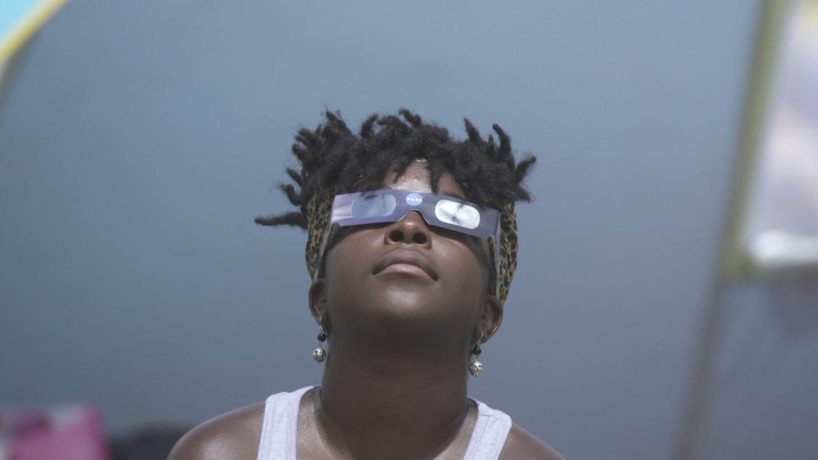
For as much substance as All Light, Everywhere emits, it's also equally as stylish. The dark subject matter is easily digestible by Anthony, who breaks the 4th wall during filming to innocently poke fun at his main interview subject (Axon spokesman Steve Tuttle) and posing interesting rhetorical questions (brought to life by voiceover artist Keaver Brenai). "Every image has a frame, and every frame has a world that's excluded beyond its edges," is just one of the quotable one-liners here. My personal favorite was the follow-up statement: "When we understand something, we say 'I See,' even though we don't."
In All Light, Everywhere, not all technology is seen as evil; the fact that it can help us overcome the limitations of our human potential is a significant counter reason. Set against a dreamy, high-tech score from composer Dan Deacon, All Light, Everywhere is an eye-opening experience that leaves us questioning how we can trust the hands that this technology falls into.
Distributed by Super LTD, All Light, Everywhere is now playing in select NY and LA theaters.
'Breaking Boundaries' Review: David Attenborough Begs Us To Trust Science, Again
Sir David Attenborough is back with another troubling but ultimately inspiring documentary about the climate crisis and how we must, must, believe the science if we are to stop hurling towards total irreversible destruction. Not a light watch, but a necessary one. Directed by John Clay, Breaking Boundaries: The Science of Our Planet is another important addition to the Attenborough school of life.
Expression
Shrinking glaciers in Sweden, rainforest degradation in the Amazon, it feels like we're becoming all too familiar with the devastating effects of the ongoing climate crisis. Sir David Attenborough has continuously tried to nail it into our heads that if we don't act now, life on the planet as we know it will be irrevocably changed forever. His latest film is more of the same – hauntingly bleak statistics, facts, and figures that are sure to wake you up – but this go around feels like more of a stern lecture from a disappointed mentor than his previously more digestible, slightly optimistic films. It gets the point across, sure, but Breaking Boundaries left me feeling more hopeless than hopeful.
Expression: 2.5 out of 5 stars
Daring
There can never be too many climate crisis documentaries. Why? Because we haven't solved the problem yet. Until then, I expect to see more films focused on this universally important issue with each one getting more serious than the next. In Breaking Boundaries, most of the information is relayed to us by world-renowned scientist Professor Johan Rockström. Throughout its 75-minute runtime, the film takes us on a journey of discovery of the 9 planetary boundaries we must maintain to keep our planet thriving at optimum capacity and protect Earth’s life support system. It feels like more of a scare tactic approach than a whimsical visual journey but maybe cold, hard facts are what some people need to truly pay attention.
Daring: 3 out of 5 stars
Craft
If you're expecting another Attenborough film with animals galore, you may be disappointed with Breaking Boundaries. Instead of primates, director Jon Clay focuses more on the people who have studied and researched the Earth's ecosystem for years. Interviews with scientists and scholars are conducted in a stereotypical talking heads style, and almost half of the film feels comprised of computer-generated graphics and TED-talk charts. We do see evidence of global warming in nature; from melting ice caps in Greenland to burned carcasses of animals in Australia's forests, there are still plenty of shocking imagery to absorb here.
Daring: 3 out of 5 stars
Impact
Typically, Attenborough documentaries are so impactful because of the stunning visuals that act alongside the narration. However, Breaking Boundaries lacks the imagery we've come to expect from past films and almost makes it seem like this would have been a good podcast. The facts are terrifying: We've already lost about 20% of the Amazon, air pollution kills over 7 million people every year and takes 3 years off of every human's life expectancy, etc. Not the most reassuring statements. Attenborough doesn't leave us on a doom and gloom note and instead offers us some simple solutions that we can easily implement into our daily lives. A couple of takeaways to help reduce carbon emissions are to plant more trees and eat more plant-based foods, less red meat. These are cost-effective and achievable and can truly save the planet.
Impact: 3.5 out of 5 stars
Conclusion
"It's a remarkable time to be alive," he exclaims despite all the worrying news he just shared. If Sir David Attenborough – Earth's #1 loyalist – can still find reasons to be optimistic about our planet's future, then we should too. The facts may be scary, unsettling, and overwhelming but by taking small action steps, including educating yourself and others by watching nature documentaries on Netflix, we can begin to create global change.
Conclusion: 3 out of 5 stars
'Breaking Boundaries: The Science of Our Planet' is streaming on Netflix on Friday, June 4, 2021.
'North Hollywood' Review: A Coming of Age Film on Skate Life
Hollywood is the epicenter of pursuing dreams. People flock there from all over the world for the small chance to make it in the entertainment industry. Just beyond the hills of Mount Hollywood – away from the infamous walk of fame and the boulevard's bright lights – is North Hollywood, a place often left out of the conversation (since it is in the valley, after all). In his directorial debut, filmmaker and skater Mikey Alfred shows that North Hollywood is also a breeding ground for dreamers and doers.
Expression
If you're familiar with the world of skateboarding, you've probably heard of Mikey Alfred. Mikey is the founder of skate crew & company Illegal Civ and served as co-producer on Jonah Hill's directorial debut Mid90s (A24). Sticking to what he knows best, Mikey's film tells the story of Michael (Ryder McLaughlin), a high school senior who wants to pursue his dream of becoming a professional skater instead of following the college status quo, much to the detest of his father (Vince Vaughn). His friends (Nico Hiraga and Na-Kel Smith) encourage his nonlinear path but when Michael gets caught up in a relationship with his longtime crush Rachel (Miranda Cosgrove), he starts to doubt what is the best move for him. The film feels like Mikey's own coming-of-age story, an extremely personal, slice of life film that will no doubt resonate with Gen Z audiences, and especially fans of Illegal Civ.
Expression: 4 out of 5 stars
Daring
Putting professional skaters in front of a camera and calling "action" is a risk in and of itself (I say that from experience). But Mikey's faith in his cast is strong and they deliver. Of course, they're not aiming for Oscar recognition but the entire cast, including Blake Anderson, Euphoria's Angus Cloud, and even Mid90s' Sunny Suljic, all bring an authentic and fun energy to their roles. It's also a blast to see Mikey incorporate a good amount of skate footage into the film like kickflips, ramps tricks, and plenty of fails. After all, he is working with an insanely talented and stellar crew.
Daring: 3 out of 5 stars
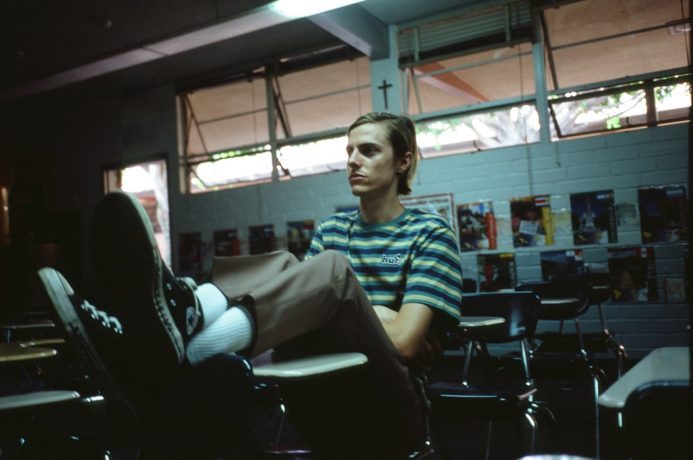
Craft
North Hollywood is backed by some pretty legit producers and exec producers, including Pharrell Williams, Noah Centineo, and Mimi Valdés to name a few. Their experience enhances Mikey's signature blend of classic Hollywood cinema and youth culture. It's a fairly traditional comedy/drama but considering the fact that 26-year-old Mikey wrote and directed the film, it's a huge achievement.
Daring: 3 out of 5 stars
Impact
Has a movie like this been made hundreds of times over? Sure. But what's unique about North Hollywood is the genuine authenticity that illuminates from the screen. These aren't your typical "too cool for school" skater boys, Michael is an insecure nerdy type who suffers from hormonal acne and still gets grounded by his dad. The characters here are aspirational skate rats, and that's a term I never thought I'd say.
Impact: 3 out of 5 stars
Conclusion
If you're looking for a less "ultra-hipster" version of Mid90s, I recommend taking a peek at North Hollywood. At its core, the film is a universal message of fighting for a dream; whether that dream is running a board room or pushing a skateboard, aiming for a future that we want is something we should all aspire towards.
Conclusion: 3 out of 5 stars
Distributed by Brainstorm Media, 'North Hollywood' is currently streaming on VOD.


